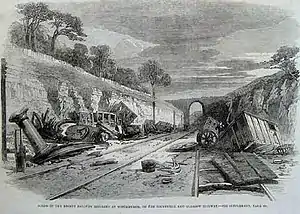Winchburgh rail crash
The Winchburgh rail crash occurred on Monday 13 October 1862, 1 1⁄2 miles (2.4 km) northwest of Winchburgh in Linlithgowshire (now West Lothian). At that point, the Edinburgh and Glasgow Railway passes through a cutting on a curve. On the day of the accident, only one line was in use due to track maintenance when two trains met head-on. The drivers saw each other when they were some 300 yards (270 m) apart and managed to slow down so that their relative speed was under 30 mph (50 km/h) when they collided. The driver of the Glasgow train leapt clear prior to the impact and survived though badly injured, but both firemen and the driver of the other train along with 15 passengers were killed and 35 injured. One of the passengers made their way to a local home named Craigton House and commandeered a horse and cart to drive over 4 miles (6.4 km) to Linlithgow, raise the alarm and summon doctors to the scene. A special train arrived from Edinburgh bringing workmen who laboured all night to free the dead and injured, and then to clear the wreckage; indeed the line was back in use the following day.
| Winchburgh rail crash | |
|---|---|
 Winchburgh rail crash | |
| Details | |
| Date | 13 October 1862 18:30 |
| Location | Winchburgh, Linlithgowshire |
| Coordinates | 55°58′26″N 3°29′32″W |
| Country | Scotland |
| Line | Edinburgh and Glasgow Railway |
| Cause | Points maintenance error |
| Statistics | |
| Trains | 2 |
| Deaths | 15 |
| Injured | 35 |
| List of UK rail accidents by year | |
To prevent such collisions, the line was being worked by a pilot engine to escort every train through the length of single track. However, the pilot engine was being used for other duties and had waggons attached to it; moreover a larger engine had been substituted for the distinctive small one used as the pilot. The inexperienced pointsman saw a ballast train following the train from Glasgow and wrongly assumed it to be the pilot engine and so let the train through; just then, the Edinburgh train was approaching from the east.
Sources
- Winchburgh Railway Disaster 1862 published 2006 by The West Lothian Local History Library which quotes from The Scotsman and The Falkirk Herald